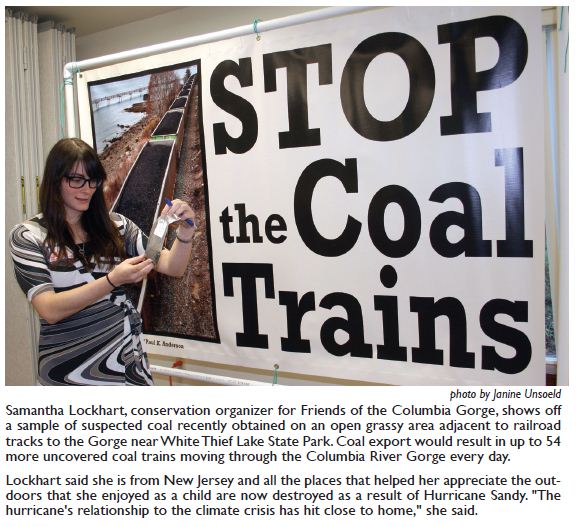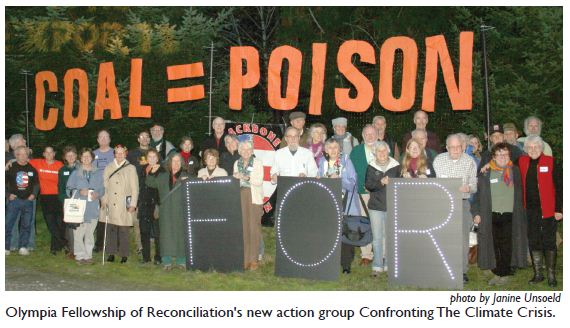Cumulative Reasons Why Coal Trains - MUST BE STOPPEDBy Molly Gibbs
Domestic demand for coal has dropped sharply in recent years. Washington enjoys cleaner, cheaper natural gas. We've pushed for closure of the coal-powered plant in Centralia. The Power River Basin (PRB) is the largest coal-producing region in the US, producing 450 million tons annually, with 40 billion tons of extractable coal reserves. The vast majority of PRB coal is publicly owned and leased at below-market prices. It's cheap: the subsidy to private corporations is estimated at $29 billion. Not all coal is the same. Powder River Basin coal is low sulfur, compared to other domestic producers, making it easier for electricity producers to comply with federal Clean Air Act standards. The amount of energy in coal is expressed in British thermal units per pound. A BTU is the amount of heat required to raise the temperature of one pound of water one degree Fahrenheit. Powder River Basin coal is low-BTU, relative to coal produced in Canada, meaning that it produces less energy per pound than other coal. While China could extract and produce its own coal, this would be far more costly than buying US coal. Currently, the US exports about 100 million tons of coal annually; less than 10% leaves West Coast ports.(1) Domestic coal producers in Montana and Wyoming identified Pacific Northwest coal export plans as their top strategic priority. Coal is moved via rail from the Powder River Basin to ports along the West Coast, which have not yet been permitted. Port locations were identified at Gateway Pacific Terminal at Cherry Point; at Millenium Bulk Terminal in Longview, and the RailAmerica Project at Gray's Harbor was cancelled. The Gateway Pacific Terminal (GPT) is a partnership between Seattle based SSA Marine and Peabody Coal. They propose a 350-acre shipping facility capable of exporting an initial 48 million metric tons of coal/yr. Increased rail traffic is a significant concern at all points along the railroad. Rail regulators raise these concerns. More than 25 sites in western Washington alone are identified, calling for critical over- and under-passes, tunnels, bypasses and complete track relocations. Concerned physicians note that traffic delays mean lost lives when critical care is needed. The GPT and Millenium projects would increase annual rail freight from 80 million to more than 170 million tons, and would increase the number of freight trains in some areas by over 100%. The Washington State Department of Transportation estimates the cost of a single overpass to average $20 million. Cost of mitigation is borne by local governments or taxpayers, and railroad companies' contribution is limited generally to 5%. Delays at rail crossings are estimated to be five to seven minutes per 144 - car train. This impacts emergency response times, access to tourist attractions, and economic centers.
Vessel traffic and safety are huge issues, particularly well expressed in the San Juan Islands. Sea captains testified about accidents and near misses in the Haro and Rosario straits. The Strait of Georgia is already one of the busiest shipping lanes in the world. The GPT would add 900 annual transits using the world's largest Panamax and Capesize vessels. No emergency services exist to serve them in Washington. Would shippers place a bond for a few billion to cover costs of a spill or derailment? These vessels increase noise pollution, risk of collision with other vessels, threaten food sources (herring) and degrade marine environment. Killer and orca whales, salmon and a myriad of shore and migratory birds would suffer losses. Rail companies say open coal cars lose between 500 - 2000 pounds of coal per car, en route to port. Cars cannot be covered because the coal would be flammable. The coal damages rail cars, lines and causes derailments. Coal dust leaches toxic heavy metals into drinking water supplies and marine environments, causing serious respiratory diseases. In early November, state legislators(2) urged Gov. Chris Gregoire to establish "an emergency SWAT team" to evaluate all potential environmental, economic and transportation issues connected to coal-export terminals. Bill McKibben, author of "The End of Nature" (1989), calls for us to undertake a nationwide Divestment campaign, to halt investment in the fossil fuel industry, as apartheid was halted in South Africa. The Environmental Impact Statement (EIS) process is underway(3) and your comments are needed. Guidelines for writing effective EIS comments are at www.ProtectWHATCOM.org. EIS scoping hearings take place in Seattle on Dec 13th, and in Longview and Spokane. For more information, go to www.PowerPastCoal.org. MP3 files with comments from South Sound citizens can be viewed at www.MovetoAmendOlympia.org.
(1) Coal Exports in Washington: Background, Proposals, Impacts and Legislative Role, Reps. Reuven Carlyle (D-Seattle) and Kristine Lytton (D-Anacortes), Nov 6, 2012. Molly Gibbs, MA, is a community organizer, communications and networking specialist, trainer, facilitator. She can be reached at mollygibbs3@gmail.com, and (360) 412-1519
Back to Home page. |

 We must measure the impact of coal pollution on health, environmental and economic costs, as well as on its airborne return from Asia to Washington State. What is the role we play in further poisoning of the Chinese people and their environment? Possibly, there have never been so many cumulative affects in any industrial undertaking, as are present in the coal trains and XL Pipeline projects.
We must measure the impact of coal pollution on health, environmental and economic costs, as well as on its airborne return from Asia to Washington State. What is the role we play in further poisoning of the Chinese people and their environment? Possibly, there have never been so many cumulative affects in any industrial undertaking, as are present in the coal trains and XL Pipeline projects.
 Badly needed passenger services are already delayed for freight trains sharing the same tracks. The relative rate difference between long-haul (coal) and short haul (apples) loads deepens conflict.
Badly needed passenger services are already delayed for freight trains sharing the same tracks. The relative rate difference between long-haul (coal) and short haul (apples) loads deepens conflict.